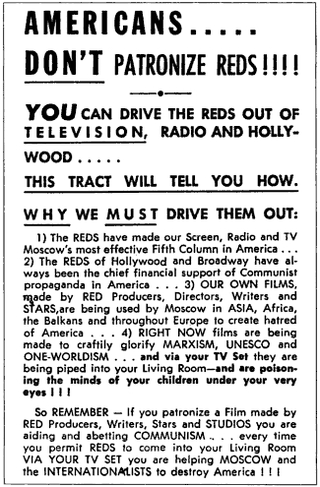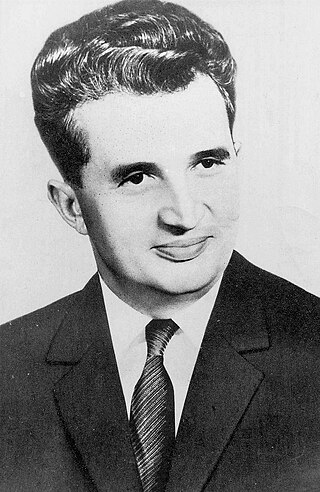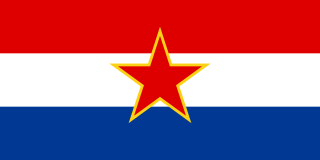Related Research Articles

Chiang Kai-shek, also known as Chiang Chung-cheng and Jiang Jieshi, was a Chinese Nationalist politician, revolutionary, and military leader who served as the leader of the Republic of China (ROC) from 1928 to his death in 1975 – until 1949 in mainland China and from then on in Taiwan. After his rule was confined to Taiwan following his defeat by Mao Zedong in the Chinese Civil War, he continued to head the ROC government in exile.

The Chinese Communist Party (CCP), officially the Communist Party of China (CPC), is the founding and sole ruling party of the People's Republic of China (PRC). Under the leadership of Mao Zedong, the CCP emerged victorious in the Chinese Civil War against the Kuomintang, and, in 1949, Mao proclaimed the establishment of the People's Republic of China. Since then, the CCP has governed China with eight smaller parties within its United Front and has sole control over the People's Liberation Army (PLA). Each successive leader of the CCP has added their own theories to the party's constitution, which outlines the ideological beliefs of the party, collectively referred to as socialism with Chinese characteristics. As of 2022, the CCP has more than 96 million members, making it the second largest political party by party membership in the world after India's Bharatiya Janata Party. The Chinese public generally refers to the CCP as simply "the Party".

Deng Xiaoping was a Chinese revolutionary leader, military commander and statesman who served as the paramount leader of the People's Republic of China (PRC) from December 1978 to November 1989. After CCP chairman Mao Zedong's death in 1976, Deng gradually rose to supreme power and led China through a series of far-reaching market-economy reforms earning him the reputation as the "Architect of Modern China". He contributed to China becoming the world's second largest economy by GDP nominal in 2010.

Josip Broz, commonly known as Tito, was a Yugoslav communist revolutionary and statesman, serving in various positions from 1943 until his death in 1980. During World War II, he was the leader of the Yugoslav Partisans, often regarded as the most effective resistance movement in German-occupied Europe. He also served as the president of the Socialist Federal Republic of Yugoslavia from 14 January 1953 until his death on 4 May 1980.

Mao Zedong, also known as Chairman Mao, was a Chinese communist revolutionary who was the founder of the People's Republic of China (PRC), which he led as the chairman of the Chinese Communist Party from the establishment of the PRC in 1949 until his death in 1976. Ideologically a Marxist–Leninist, his theories, military strategies, and political policies are collectively known as Maoism.

Alexander Dubček was a Slovak politician who served as the First Secretary of the Presidium of the Central Committee of the Communist Party of Czechoslovakia (KSČ) from January 1968 to April 1969. He attempted to reform the communist government during the Prague Spring but was forced to resign following the Warsaw Pact invasion in August 1968.

McCarthyism is the practice of making false or unfounded accusations of subversion and treason, especially when related to anarchism, communism and socialism, and especially when done in a public and attention-grabbing manner.

Nicolae Ceaușescu was a Romanian communist politician and dictator. He was the general secretary of the Romanian Communist Party from 1965 to 1989, and the second and last Communist leader of Romania. He was also the country's head of state from 1967, serving as President of the State Council and from 1974 concurrently as President of the Republic, until his overthrow and execution in the Romanian Revolution in December 1989, part of a series of anti-Communist uprisings in Eastern Europe that year.

Zhou Enlai was a Chinese statesman and military officer who served as the first premier of the People's Republic of China from 1 October 1949 until his death on 8 January 1976. Zhou served under Chairman Mao Zedong and helped the Communist Party rise to power, later helping consolidate its control, form its foreign policy, and develop the Chinese economy.

The Chinese Civil War was fought between the Kuomintang-led government of the Republic of China and forces of the Chinese Communist Party, continuing intermittently since 1 August 1927 until 7 December 1949 with a Communist victory on mainland China.

The Velvet Revolution or Gentle Revolution was a non-violent transition of power in what was then Czechoslovakia, occurring from 17 November to 28 November 1989. Popular demonstrations against the one-party government of the Communist Party of Czechoslovakia included students and older dissidents. The result was the end of 41 years of one-party rule in Czechoslovakia, and the subsequent dismantling of the command economy and conversion to a parliamentary republic.
A Red Scare is the promotion of a widespread fear of a potential rise of communism, anarchism or other leftist ideologies by a society or state. The term is most often used to refer to two periods in the history of the United States which are referred to by this name. The First Red Scare, which occurred immediately after World War I, revolved around a perceived threat from the American labor movement, anarchist revolution, and political radicalism. The Second Red Scare, which occurred immediately after World War II, was preoccupied with the perception that national or foreign communists were infiltrating or subverting American society and the federal government. The name refers to the red flag as a common symbol of communism.

Paramount leader is an informal term for the most important political figure in the People's Republic of China (PRC). The paramount leader typically controls the Chinese Communist Party (CCP) and the People's Liberation Army (PLA), often holding the titles of CCP General Secretary and Chairman of the Central Military Commission (CMC). The head of state (president) or head of government (premier) are not necessarily paramount leader—under China's party-state system, CCP roles are politically more important than state titles.

The Socialist Republic of Romania was a Marxist–Leninist one-party socialist state that existed officially in Romania from 1947 to 1989. From 1947 to 1965, the state was known as the Romanian People's Republic. The country was an Eastern Bloc state and a member of the Warsaw Pact with a dominant role for the Romanian Communist Party enshrined in its constitutions. Geographically, RSR was bordered by the Black Sea to the east, the Soviet Union to the north and east, Hungary and Yugoslavia to the west, and Bulgaria to the south.

The Communist Party USA, officially the Communist Party of the United States of America (CPUSA), is a communist party in the United States which was established in 1919 after a split in the Socialist Party of America following the Russian Revolution.

The Socialist Republic of Croatia, or SR Croatia, was a constituent republic and federated state of the Socialist Federal Republic of Yugoslavia. By its constitution, modern-day Croatia is its direct continuation.

The Hungarian People's Republic was a one-party socialist state from 20 August 1949 to 23 October 1989. It was governed by the Hungarian Socialist Workers' Party, which was under the influence of the Soviet Union. Pursuant to the 1944 Moscow Conference, Winston Churchill and Joseph Stalin had agreed that after the war Hungary was to be included in the Soviet sphere of influence. The HPR remained in existence until 1989, when opposition forces brought the end of communism in Hungary.
Communism is a far-left sociopolitical, philosophical, and economic ideology and current within the socialist movement whose goal is the establishment of a communist society, a socioeconomic order centered around common ownership of the means of production, distribution, and exchange which allocates products to everyone in the society. Communist society also involves the absence of private property, social classes, money, and the state. Communists often seek a voluntary state of self-governance, but disagree on the means to this end. This reflects a distinction between a more libertarian approach of communization, revolutionary spontaneity, and workers' self-management, and a more vanguardist or communist party-driven approach through the development of a constitutional socialist state followed by the withering away of the state.
Anti-communism is political and ideological opposition to communism. Organized anti-communism developed after the 1917 October Revolution in the Russian Empire, and it reached global dimensions during the Cold War, when the United States and the Soviet Union engaged in an intense rivalry. Anti-communism has been an element of movements which hold many different political positions, including conservatism, fascism, liberalism, nationalism, social democracy, libertarianism, or the anti-Stalinist left. Anti-communism has also been expressed in philosophy, by several religious groups, and in literature. Some well-known proponents of anti-communism are former communists. Anti-communism has also been prominent among movements resisting communist governance.

Georgy Maximilianovich Malenkov was a Soviet politician who briefly succeeded Joseph Stalin as the leader of the Soviet Union. However, at the insistence of the rest of the Presidium, he relinquished control over the party apparatus in exchange for remaining Premier and first among equals within the Soviet collective leadership. He then became embroiled in a power struggle with Nikita Khrushchev that culminated in his removal from the premiership in 1955 as well as the Presidium in 1957.
References
- ↑ Biographical note contained in the Collected Works of Karl Marx and Frederick Engels: Volume 10 (International Publishers: New York, 1978) p. 722.